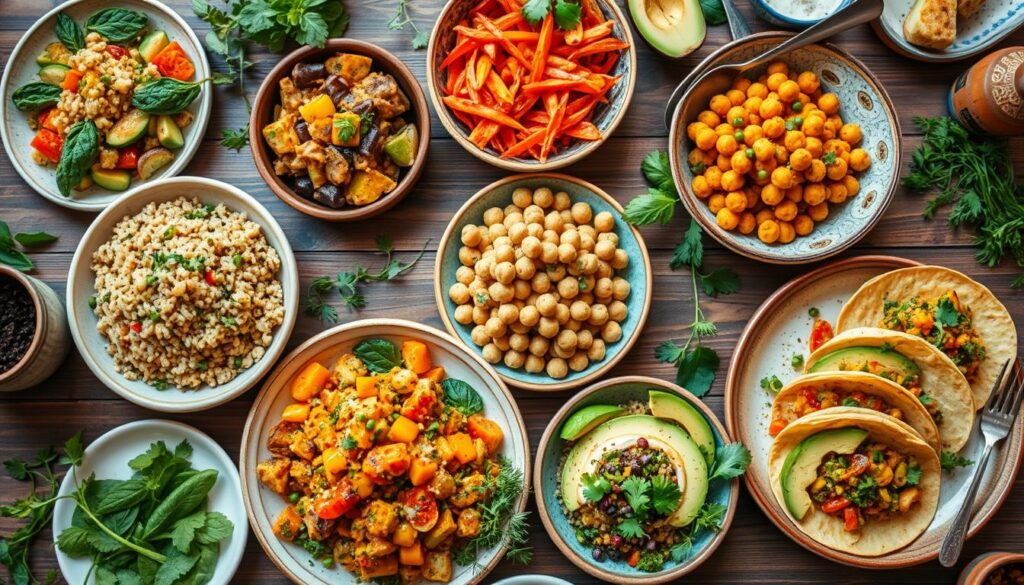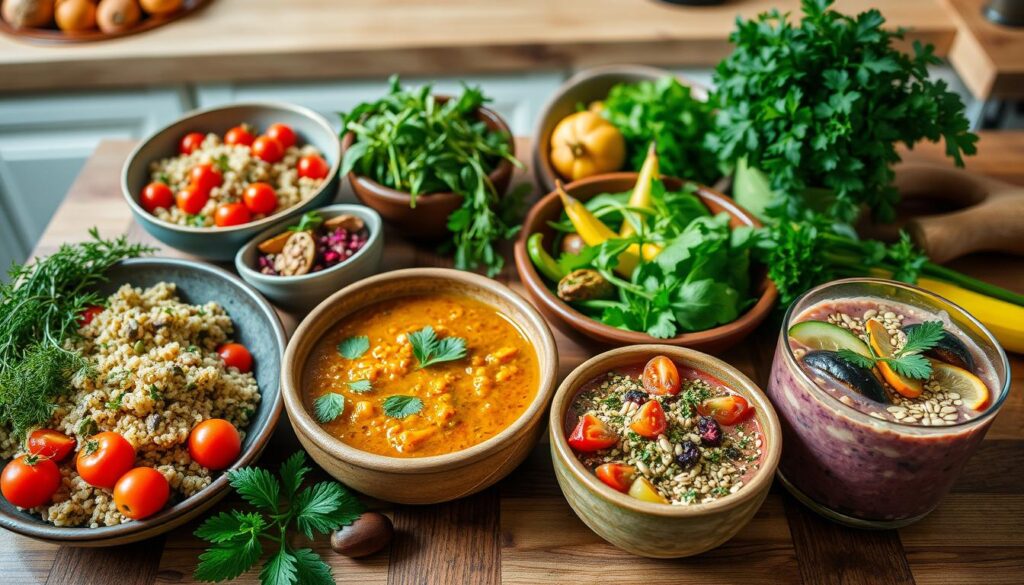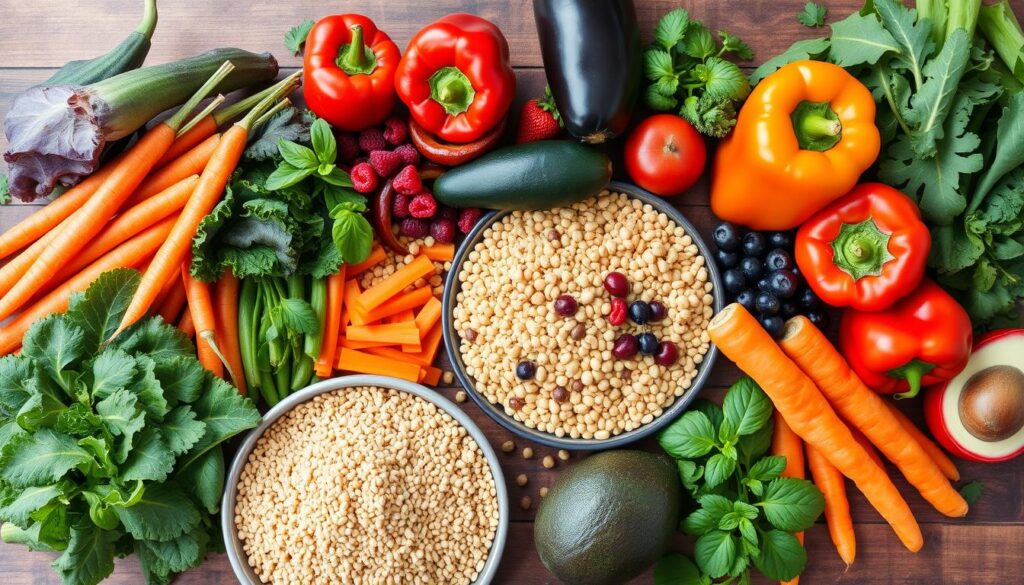Imagine you’re in your kitchen, surrounded by colorful fruits, veggies, and whole grains. The smell of cooking lentils fills the air. This is more than just a healthy meal; it’s your new way of life. Welcome to the world of plant-based meal planning, where tasty flavors meet healthy choices.
More people are choosing plant-based diets for their health. The need for tasty, satisfying meatless meals is growing. Whether you’re a seasoned vegetarian or new to vegan recipes, making a plant-based meal plan is fun and rewarding.
In this guide, we’ll take you on a week-long journey of plant-based eating. It’s designed to nourish your body and delight your taste buds. We’ll show you how to make a balanced vegetarian diet that’s full of flavor and nutrition.
Get ready to explore a world of culinary possibilities. We’ll cover breakfast smoothie bowls, lunch salads, and dinner stews. By the end of this adventure, you’ll have a collection of vegan recipes to make meal planning easy.
Key Takeaways
- Plant-based meal plans can be both nutritious and budget-friendly
- A well-planned vegetarian diet meets nutritional needs and offers health benefits
- Meal prep and batch cooking are essential for successful plant-based eating
- Diverse ingredients ensure a balanced and satisfying meatless meal plan
- Plant-based diets can be tailored to different calorie needs and preferences
Table of Contents
Understanding Plant-Based Eating
Plant-based eating is becoming more popular. It’s seen as a healthy and sustainable way to eat. This diet focuses on foods from plants, like fruits, vegetables, and whole grains.
Definition of a plant-based diet
A plant-based diet is all about eating foods from plants. It includes fruits, vegetables, legumes, nuts, seeds, and whole grains. It doesn’t mean you can’t eat animal products, but plants are the main focus. This diet is flexible, making it easier for people to start.
Plant-based vs. vegan: Key differences
Plant-based and vegan diets both focus on plant foods. But, vegans don’t eat any animal products. Plant-based eaters might eat them sometimes. This makes plant-based eating easier for those new to it.
| Aspect | Plant-Based Diet | Vegan Diet |
|---|---|---|
| Food Focus | Primarily plant foods | Exclusively plant foods |
| Animal Products | Occasional consumption allowed | Strictly avoided |
| Flexibility | More flexible | Less flexible |
Health benefits of plant-based eating
Eating plant-based can make you healthier. Studies show it helps with weight loss. It also lowers the risk of heart disease, type 2 diabetes, and some cancers.
Plant-based diets are associated with a 23% lower risk of type 2 diabetes, according to a study published in JAMA Internal Medicine.
Starting a plant-based diet can improve your health. If you’re also starting a fitness journey, fitness tips for beginners can help.
By cooking with whole foods and using many plant-based ingredients, you can make tasty, healthy meals. These meals support your health goals and help the planet.
Essential Components of a Plant-Based Meal Plan
A good plant-based meal plan includes whole foods and lots of nutrients. This eating style is great for your health and can bring many benefits. Let’s look at the main parts of a healthy plant-based diet.
Protein Sources: Legumes, Nuts, and Seeds
Plant-based eating doesn’t mean you’ll miss out on protein. Legumes, nuts, and seeds are full of plant protein. Foods like lentils, black beans, chickpeas, almonds, and chia seeds are perfect for meatless meals. They give you protein, fiber, and important minerals.
Whole Grains and Complex Carbohydrates
Whole grains like quinoa, brown rice, and oats are key in vegan recipes. They give you lasting energy and important nutrients. These carbs help keep your blood sugar steady and support your gut health.
Fruits and Vegetables: Variety is Key
Fruits and vegetables should be the main focus of any plant-based meal plan. They are full of vitamins, minerals, and antioxidants that are vital for health. Try to eat a variety of leafy greens, colorful veggies, and fresh fruits every day.
Healthy Fats from Plant Sources
Don’t forget about fats in your plant-based diet. Avocados, olive oil, and nuts are full of healthy fats. These fats are good for your heart and help your body absorb nutrients and support your brain.
| Food Group | Examples | Key Nutrients |
|---|---|---|
| Legumes | Lentils, Chickpeas, Black Beans | Protein, Fiber, Iron |
| Nuts and Seeds | Almonds, Chia Seeds, Walnuts | Protein, Healthy Fats, Omega-3s |
| Whole Grains | Quinoa, Brown Rice, Oats | Complex Carbs, B Vitamins |
| Fruits | Berries, Citrus, Apples | Vitamins, Antioxidants |
| Vegetables | Kale, Broccoli, Sweet Potatoes | Fiber, Minerals, Phytonutrients |
By adding these key elements, you can make tasty and healthy plant-based meals. Remember, it’s all about balance and variety to get all the nutrients your body needs.
Meal Plan Plant Based: 7-Day Sample Menu
Starting a plant-based diet? Our 7-day menu offers tasty and healthy meatless meals. It’s packed with vegan recipes to keep you excited and well-nourished.
Plant-based diets are great for your health. They can lower disease risk, as the Journal of Translational Psychiatry found. Let’s dive into a week of plant-based eating!
| Day | Breakfast | Lunch | Dinner |
|---|---|---|---|
| Monday | Overnight oats with berries | Lentil soup with whole grain bread | Cauliflower curry with brown rice |
| Tuesday | Tofu scramble with spinach | Chickpea salad sandwich | Vegetable stir-fry with quinoa |
| Wednesday | Whole grain pancakes with fruit | Black bean burrito bowl | Eggplant lasagna |
| Thursday | Smoothie bowl with nuts and seeds | Hummus and veggie wrap | Lentil shepherd’s pie |
| Friday | Avocado toast on sprouted bread | Quinoa and roasted vegetable salad | Mushroom risotto |
| Saturday | Chia seed pudding with mango | Vegetable sushi rolls | Grilled portobello steaks with sweet potato mash |
| Sunday | Vegan French toast with maple syrup | Minestrone soup | Cauliflower pizza with cashew cheese |
This meal plan is for 2,000 calories a day, with the right mix of carbs, proteins, and fats. It’s full of fiber from fruits, veggies, legumes, nuts, and seeds. Don’t forget to drink plenty of water and think about taking vitamin B12 and D supplements for a healthy plant-based diet.
Breakfast Ideas for Plant-Based Eaters
Starting your day with a plant-based breakfast is a great way to live healthy. There are many tasty vegan recipes to choose from. Let’s look at some easy and delicious options for your morning.
Overnight Oats Variations
Overnight oats are a favorite for plant-based breakfasts. Just mix oats with non-dairy milk and your favorite toppings. Here are some great combinations:
- Banana and almond butter
- Mixed berries and chia seeds
- Apple cinnamon with walnuts
Tofu Scrambles and Vegetable-Packed Omelets
For a protein-packed breakfast, try a tofu scramble. Crumble firm tofu and cook it with turmeric, nutritional yeast, and veggies. Chickpea flour is great for veggie-packed omelets. These are perfect for those on a vegetarian diet or looking for vegan recipes.
Whole Grain Pancakes and Waffles
Make fluffy pancakes or crispy waffles with whole grain flour. Top them with fresh fruits, nuts, and maple syrup. These breakfast favorites are easy to make plant-based.
| Breakfast Idea | Protein Source | Healthy Fat | Complex Carb |
|---|---|---|---|
| Overnight Oats | Chia seeds | Almond butter | Oats |
| Tofu Scramble | Tofu | Avocado | Whole grain toast |
| Chickpea Omelet | Chickpea flour | Olive oil | Vegetables |
| Whole Grain Pancakes | Plant-based milk | Nuts | Whole grain flour |
A balanced plant-based breakfast has protein, healthy fats, and complex carbs. Try different combinations to find your favorite morning meals.
Nutritious Lunch Options on a Plant-Based Diet
Planning meatless meals for lunch can be exciting and delicious. A plant-based meal plan offers many options that are both tasty and healthy. Let’s look at some tasty lunch ideas for your vegetarian diet.
Whole-wheat pasta salads with chickpeas and veggies are a favorite. They’re simple to make and full of nutrients. For extra protein, try tofu salad. It’s ready in just 10 minutes, perfect for when you’re in a hurry.
Wraps and sandwiches are quick and easy. Fill them with hummus, avocado, and colorful veggies. They’re ready in about 15 minutes, great for a fast lunch.
If you love soup, try vegetable or lentil soups. They’re full of fiber and protein, keeping you full all afternoon. Vegetarian chili with quinoa and beans is another great choice.
| Lunch Option | Prep Time | Average Rating |
|---|---|---|
| Tofu Salad | 10 minutes | 4.7/5 |
| Veggie Wrap | 15 minutes | 4.5/5 |
| Lentil Soup | 25 minutes | 4.8/5 |
| Pasta Salad | 20 minutes | 4.6/5 |
These plant-based lunch options have received great feedback, with an average rating of 4.5 out of 5 stars. The variety ensures you’ll never get bored with your meal plan. Remember, meal prep on Sundays can save time during the week. Enjoy exploring these delicious and nutritious plant-based lunch ideas!
Delicious Plant-Based Dinner Recipes
Discover a world of flavors with these vegan dinner recipes. Plant-based nutrition shines in these tasty, meatless meals.

Hearty Vegetable Stews and Soups
Warm up with comforting stews and soups full of nutrients. Try a Moroccan sweet potato and chickpea stew or a classic minestrone. These dishes are great for meal prep and taste better the next day.
Plant-based Protein Mains
Enjoy protein-rich entrees that keep you full. Make a tofu curry in 30 minutes or a lentil bolognese for a twist on Italian food. For special events, stuff a butternut squash with quinoa and veggies.
Creative Salad Combinations
Try these innovative salad combinations:
- Mediterranean cauliflower salad with creamy tahini dressing
- Black bean salad with tangy cilantro-lime vinaigrette
- Lentil salad with colorful vegetables
These plant-based dinner ideas show that meatless meals can be exciting and delicious. With 31 easy recipes, you’ll always have tasty, nutritious dinner ideas.
| Recipe Type | Prep Time | Key Ingredients |
|---|---|---|
| Tofu Curry | 30 minutes | Tofu, coconut milk, vegetables |
| Lentil Bolognese | 45 minutes | Lentils, tomatoes, herbs |
| Stuffed Butternut Squash | 60 minutes | Butternut squash, quinoa, vegetables |
Try different cooking methods like stir-frying, grilling, and roasting to mix up your meals. Keep canned beans, quinoa, and spices on hand for quick meals.
Snacks and Desserts for Plant-Based Diets
Plant-based diets don’t mean you have to give up tasty snacks and desserts. You can make delicious vegan recipes that are both satisfying and nutritious. Let’s look at some yummy options that fit with plant-based nutrition.
Snacks help keep your energy up all day. Try roasted edamame for a protein-rich snack or homemade kale chips for a crunchy treat. A mix of raw nuts and dried fruit is perfect for a healthy snack.
For those who love desserts, there are plenty of plant-based choices. Strawberry lemon oat squares are a refreshing treat with whole grains and fresh fruit. Chocolate avocado truffles offer a creamy texture without dairy. And, vegan cheesecake made with cashews is a holistic wellness way to enjoy a sweet treat.
“Plant-based desserts can be just as satisfying as traditional ones. The key is using whole, nutrient-dense ingredients creatively,” says a renowned plant-based chef.
Here’s a simple recipe for banana “ice cream” that’s great for hot summer days:
- Freeze ripe bananas
- Blend frozen bananas until smooth
- Add a dollop of nut butter
- Enjoy your creamy, guilt-free treat!
| Snack | Ingredients | Prep Time |
|---|---|---|
| Date-Nut Balls | Dates, nuts, nut butter | 15 minutes |
| Chickpea Cookie Dough | Chickpeas, nut butter, maple syrup, oats | 10 minutes |
| Air-Fried Fruit Crumble | Mixed fruits, oats, nuts | 20 minutes |
Remember, plant-based eating is about nourishing your body with delicious foods. With these snack and dessert ideas, you’ll never feel like you’re missing out on your plant-based journey.
Meal Prep Tips for Success on a Plant-Based Plan
Mastering meal prep is key to thriving on a plant-based diet. With smart strategies, you can save time and ensure nutritious meals throughout the week. Let’s explore some effective techniques for your meal plan plant based journey.
Batch Cooking Strategies
Batch cooking is a game-changer for plant-based nutrition. Cook large portions of grains, legumes, and vegetables on your prep day. This approach allows you to mix and match ingredients for varied meals during the week. Try these tips:
- Cook a big pot of quinoa or brown rice
- Roast a tray of mixed vegetables
- Prepare a large batch of lentil soup
Storage and Reheating Guidelines
Proper storage is crucial for maintaining food quality and safety. Use airtight containers to keep your prepped meals fresh. Here’s a quick guide for reheating:
| Food Item | Storage Time | Reheating Method |
|---|---|---|
| Cooked Grains | 3-4 days | Microwave with splash of water |
| Roasted Vegetables | 4-5 days | Oven at 350°F for 10 minutes |
| Soups/Stews | 3-4 days | Stovetop, stirring occasionally |
Time-saving Kitchen Tools
Investing in the right tools can significantly streamline your whole food cooking process. Consider these essentials:
- High-speed blender for smoothies and sauces
- Food processor for chopping and shredding
- Instant Pot for quick cooking beans and grains

Remember, successful meal prep is about finding what works for you. Experiment with different strategies and tools to create a plant-based meal plan that fits your lifestyle and preferences.
Conclusion
Choosing a meal plan plant based has many health and environmental perks. Studies show it can lower obesity rates and heart disease risks. A 2014 Yale study found that eating more plant foods helps prevent diseases.
Plant-based nutrition is getting more popular, with U.S. sales up by 11 percent. This matches research like The China Study, showing plant-rich diets lead to longer, healthier lives. Adding vegan recipes to your diet can make meals tasty and boost your health with more fiber and nutrients.
Starting a plant-based diet requires good planning and prep. This guide helps you find tasty, healthy meals with various protein sources and whole foods. With more evidence supporting its benefits, going plant-based can improve your health and help the planet.
FAQ
What is a plant-based diet?
A plant-based diet mainly includes foods from plants like fruits, veggies, nuts, seeds, and whole grains. It also includes legumes and beans. It’s not always vegetarian or vegan, as it might include animal products sometimes.
What are the key differences between a plant-based and vegan diet?
A vegan diet doesn’t include any animal products. But, a plant-based diet might include small amounts of animal products like dairy or eggs. Both diets focus on eating more plant-based foods.
What are some health benefits of a plant-based diet?
A plant-based diet can help you eat more fiber, lose weight, and lower your risk of type 2 diabetes and heart disease.
What are good plant-based protein sources?
Great plant-based protein sources are legumes like beans, lentils, and edamame. Nuts, seeds, and whole grains like quinoa and brown rice are also good.
How can I ensure I’m getting enough variety on a plant-based diet?
To get a variety of nutrients, eat different fruits, veggies, whole grains, legumes, nuts, and seeds. This will add flavor and nutrients to your meals.
What are some meal prep tips for a plant-based diet?
Batch cooking grains and legumes, making overnight oats, and cooking big batches of soups or stews can save time. Use blenders and food processors to make prep easier. Also, store and reheat food properly to keep it fresh.
Can a plant-based diet be budget-friendly?
Yes, a plant-based diet can be affordable. Fruits, veggies, grains, and legumes are often cheap. Buying them in season or bulk can help save money.

Hey, I am Dr. Jenna Calloway. What you put into your body is what, intrinsically, makes the difference between success and burnout. Healthy food is fuel, and after years of working with high-performing professionals, I’ve put together nutrition strategies that are not only healthy but delicious and realistically easy to fit into your busy life. Whether you’re powering through a hectic day or looking to elevate your workouts, let me guide you on the path toward feeling your absolute best!

